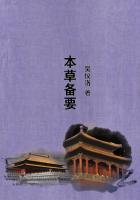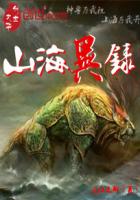The former view, fortunately upheld by few, is strikingly set forth in Granald's `The Mock-bird and the Sparrow'.After describing minutely the various songs of the mocking-bird and emphasizing that they all come from other birds, the author gives the dialogue between the mock-bird and the sparrow.The former taunted the latter and insisted on his singing; and"The sparrow cock'd a knowing eye, And made him this most tart reply --`You steal from all and call it wit, But I prefer my ****** "twit".'"But the latter view is espoused by most of the writers mentioned, notably and nobly by Drake, the Haynes, the Laniers, Lee, Meek, and Thompson, the poet-laureate of the mocking-bird, whose poems should be read by every lover of nature and especially of the mocking-bird.
As Thompson's tributes are all too long for quotation, I give here Meek's, in the hope that I may rescue it from the long oblivion of an out-of-print.
My attention was called to it by my friend, Dr.C.H.Ross, to whom every reader will be indebted along with myself.It runs as follows:
"From the vale, what music ringing, Fills the bosom of the night;On the sense, entranced, flinging Spells of witchery and delight!
O'er magnolia, lime and cedar, From yon locust-top, it swells, Like the chant of serenader, Or the rhymes of silver bells!
Listen! dearest, listen to it!
Sweeter sounds were never heard!
'Tis the song of that wild poet Mime and minstrel -- Mocking-bird.
"See him, swinging in his glory, On yon topmost bending limb!
Carolling his amorous story, Like some wild crusader's hymn!
Now it faints in tones delicious As the first low vow of love!
Now it bursts in swells capricious, All the moonlit vale above!
Listen! dearest, etc.
"Why is't thus, this sylvan Petrarch Pours all night his serenade?
'Tis for some proud woodland Laura, His sad sonnets all are made!
But he changes now his measure Gladness bubbling from his mouth Jest and gibe, and mimic pleasure Winged Anacreon of the South!
Listen! dearest, etc.
"Bird of music, wit and gladness, Troubadour of sunny climes, Disenchanter of all sadness, --Would thine art were in my rhymes.
O'er the heart that's beating by me, I would weave a spell divine;Is there aught she could deny me, Drinking in such strains as thine?
Listen! dearest, etc."
As is well known, the mocking-bird is often called the American nightingale.
As to their relative merits as singers, here is the judgment of one that has heard both birds, Professor James A.Harrison (`The Critic', New York, 2.284, December 13, 1884): "Well, it is my honest opinion that philomel will not compare with the singer of the South in sweetness, versatility, passion, or lyrical beauty.The mocking-bird -- better the echo-bird, with a voice compounded of all sweet sounds, as the blossom of the Chinese olive is compounded of all sweet scents --is a pure lyrist; its throat is a lyre -- Aeolian, capricious, many-stringed;as its name suggests, it is a polyglot mime, a bird linguist, a feathered Mezzofanti singing all the bird languages; yet over and above all this, with a something of its own that cannot be described."The mocking-bird speaks for himself in Thompson's `To an English Nightingale':
"What do you think of me?
Do I sing by rote?
Or by note?
Have I a parrot's echo-throat?
Oh no! I caught my strains From Nature's freshest veins.
.....
"He A match for me!
No more than a wren or a chickadee!
Mine is the voice of the young and strong, Mine the soul of the brave and free!"This self-appreciation is confirmed by the greatest authority on birds, Audubon: "There is probably no bird in the world that possesses all the musical qualifications of this king of song, who has derived all from Nature's self.Yes, reader, all!"It will be interesting and instructive to compare the tributes to the mocking-bird with Keats's `Ode to a Nightingale', Shelley's `To a Skylark', and Wordsworth's `To the Skylark'.
Aside from Audubon's `Birds of America' and Ridgway's `Manual of North American Birds', the student may consult with profit Burroughs's `Birds and Poets', Thompson's `In the Haunts of the Mocking-bird'
(`The Atlantic', 54.620, November, 1884), various articles by Olive Thorne Miller in `The Atlantic' (vol.54 on), and Winterfield's `The Mocking-bird, an Indian Legend' (`The American Whig Review', New York, 1.497, May, 1845).
14.Wilde compares the mocking-bird to Yorick and to Jacques;Meek, to Petrarch; Lanier, to Keats, in `To Our Mocking-bird', as does Wm.H.Hayne:
"Each golden note of music greets The listening leaves divinely stirred, As if the vanished soul of Keats Had found its new birth in a bird."Song of the ChattahoocheeOut of the hills of Habersham, [1]
Down the valleys of Hall, I hurry amain to reach the plain, Run the rapid and leap the fall, Split at the rock and together again, Accept my bed, or narrow or wide, And flee from folly on every side With a lover's pain to attain the plain Far from the hills of Habersham, Far from the valleys of Hall.
All down the hills of Habersham, [11]
All through the valleys of Hall, The rushes cried `Abide, abide,'
The willful waterweeds held me thrall, The laving laurel turned my tide, The ferns and the fondling grass said `Stay,'
The dewberry dipped for to work delay, And the little reeds sighed `Abide, abide, Here in the hills of Habersham, Here in the valleys of Hall.'
High o'er the hills of Habersham, [21]
Veiling the valleys of Hall, The hickory told me manifold Fair tales of shade, the poplar tall Wrought me her shadowy self to hold, The chestnut, the oak, the walnut, the pine, Overleaning, with flickering meaning and sign, Said, `Pass not, so cold, these manifold Deep shades of the hills of Habersham, These glades in the valleys of Hall.'
And oft in the hills of Habersham, [31]















